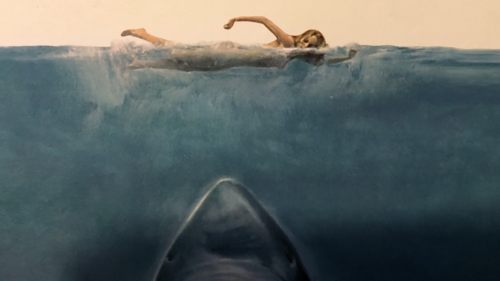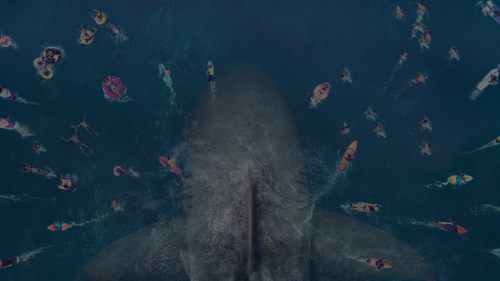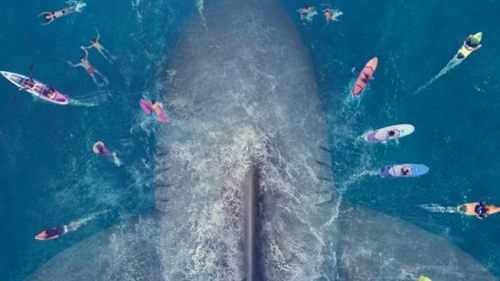Why We Bite: Sharks As Cinema’s Apex Predators
Get your Jaws on the Water tickets here!
Shark movies are among the most beautiful facets in the diamond of cinema. Audiences flock to them, if not en masse, then enough to guarantee their continued production, from the silent era to today. The phrase “shark-infested waters” conjures up primal, scary, thrilling imagery that everybody loves - yes, even you. Whether it’s at the movies, on YouTube, or in a VR headset, shark content is irresistible.
But while shark-cage GoPro videos and Discovery documentaries are fun, shark movies - feature films - are the true apex predators. Even the dumbest shark movies spark at least subconscious interest in potential viewers. I should know: I made one.
Jaws might be the biggest shark movie in history, but it wasn’t the first. Documentaries followed the creatures for decades before Bruce ever stalked the beachgoers of Amity Island. Adventure flicks (and James Bond films) featured sharks as dangerous obstacles, while dramas used them as metaphors. Seeing the word “shark” in a title - even for wholly shark-unrelated films - has long been enough to pique anyone’s interest.
Why sharks? Why not, say, lions? Or spiders? Plenty of films have been made about them, but they don’t constitute a genre in the same way that shark films do. Granted, the genre’s tropes - traumatised tourists, wilfully blind officials, salty sea captains, stock footage - were formalised by Jaws. The release of a megahit, immediately spawning imitators, is bound to define a subgenre. But despite that film’s masterful construction and historical importance, I honestly believe the appeal of shark movies lies deeper, so to speak.
Part of the attraction lies in the ocean - at least for me. Dark and murky, the stygian depths would be frightening by themselves, even if they didn’t contain innumerable horrors just waiting for us to dip a toe into their realm. Humankind's ancestors left the sea millions of years ago for a reason, and we are quite clearly not meant to return there. In other words, the ocean is a prime setting for horror: it’s inhospitable and difficult to see in, with proper, actual monsters hanging out freaking everywhere. Most have razor-sharp teeth; some have spikes or poison skin; a few even fucking glow in the dark. It’s a nightmare down there.
And yet we can’t keep ourselves away! Unthinkably, human beings flock to the ocean for recreation and food, sometimes training for months to do so, like idiots. But while overfishing and pollution are eliminating some of the ocean's terrors, others still swim beneath the waves, ready to strike. That simple knowledge (or more accurately, lack thereof) is enough to paralyse this writer with dread. But there’s an allure that comes along with that. Letting one’s feet trail off the side of a boat is like peeking over the edge of a skyscraper for me: it’s unclear whether I’m more scared that I might fall in, or that I might jump. Or, indeed, that something could swim up unseen and pull me down into that airless abyss.
Sharks are the poster children for the undersea beast ecosystem. They’re the closest thing we have to dinosaurs: streamlined, perfect predators, built for hunting and not much else. As far as animals go, they’re not quite the deadliest around (they lack venom and don’t lay their eggs inside other animals’ brains, for example), but they certainly look the part, with cold, black eyes and teeth for miles. To stare into the face of an attacking great white is to make eye contact with death. Forget the xenomorph; the shark is truly the perfect creature.
Why wouldn’t you want to watch a movie about all that shit?
As scary as sharks are, they also conjure feelings of awe, fascination, and respect. Sharks haven’t changed much over the past hundred million years or so, largely because they don’t need to - they ain’t broke, so nature ain’t fixin' ‘em. There’s something almost noble about their role atop the oceanic food chain, laying down the law in a lawless world. Sadly, though, human beings (as is typical) are hunting them to a slow extinction out of misplaced fear - something that angers me, a confirmed selachophobe, more than it feels like it should. I respect sharks not despite but because of the fact that I’m afraid of them. I know I’m not the only person to ravenously consume books about sharks as a child, too scared to peek at the pictures yet unable to tear myself away. Shark movies are largely to blame for that fear (shark attacks themselves are relatively infrequent - there's a reason why they make the news), but they're also responsible for the awe.
Nowadays, shark movies are surrounded by the stink of cynicism - but that’s nothing particularly new. Post-Jaws, dozens of studios and filmmakers sought to cash in on shark-attack fever, and in essence, the cash-ins continue to this day. Cheap foreign knockoffs like Mako: The Jaws of Death, Tintorera!, or the surprisingly good The Last Shark, and carbon copies with different animals, like Orca or Piranha or Grizzly, have dotted the landscape ever since Jaws blew people away in 1975. They certainly haven’t gone away: the last decade has seen the release of Shark Night, Bait, The Shallows, The Reef, 47 Meters Down, and a rebooted Piranha - not all of which are terrible. The Shallows and 47 Meters Down, in particular, strip the genre back to basics, exploring simple scenarios that prey upon shark-related fears.
Tragically, the modern shark-movie revival has been accompanied by forced, self-consciously shitty filmmaking, aimed at the “ironic” movie-watching habits of the Internet-meme age. These movies, mostly made by the likes of SyFy or The Asylum, lack any sense of love for their genre, instead focusing on how “terribad” the filmmaking is. It’s not impossible to make a decent, fun movie about a shark tornado or a three-headed shark; it’s just that the studios making them apparently don’t think it’s worth producing something worthwhile out of those ideas. Even the likes of Deep Blue Sea or the Shark Attack trilogy had at least a modicum of self-respect.
Ultimately, the continued success of the SyFy shark-movie cycle demonstrates there's still a hunger for shark films. People might claim they watch Sharknado 5 (or whatever the hell they’re up to now) ironically, but sharks definitely factor into their decision to hit play, whether or not they admit it. We don’t see people talking about Lavalantula nearly as much, after all.
For all my despair over the Sharknados of the world, there’s life in the shark genre yet. The Shallows restored my belief in it last year, scaring the shit out of me with efficient, tense filmmaking. I haven’t seen 47 Metres Down yet, but I know that I will. Ditto next year’s Meg, which though undoubtedly an action-driven Jason Statham vehicle, will equally undoubtedly give me the fucking wiggins. (Yes, I've read the ridiculous source material.) And I’ve got rough plans to expand my own shark series out to five movies, if that ever becomes plausible (and if SyFy doesn't rip it off like they did with the last one).
That said, it’d take a mammoth amount of convincing for me to attend a screening of Jaws on the water. As much as I love Jaws, and site-specific screenings, that’s one experience I’m just too scared to try. But hey, if it’s your thing, go right ahead. Just don’t blame me when you’re sucked under the surface, the sunlight receding from view as you’re either drowned or eaten - by the creature that’s both the world’s greatest predator, and the world’s greatest movie star.
This article is part of B.M.D. Guide To: SHARKS!!!



